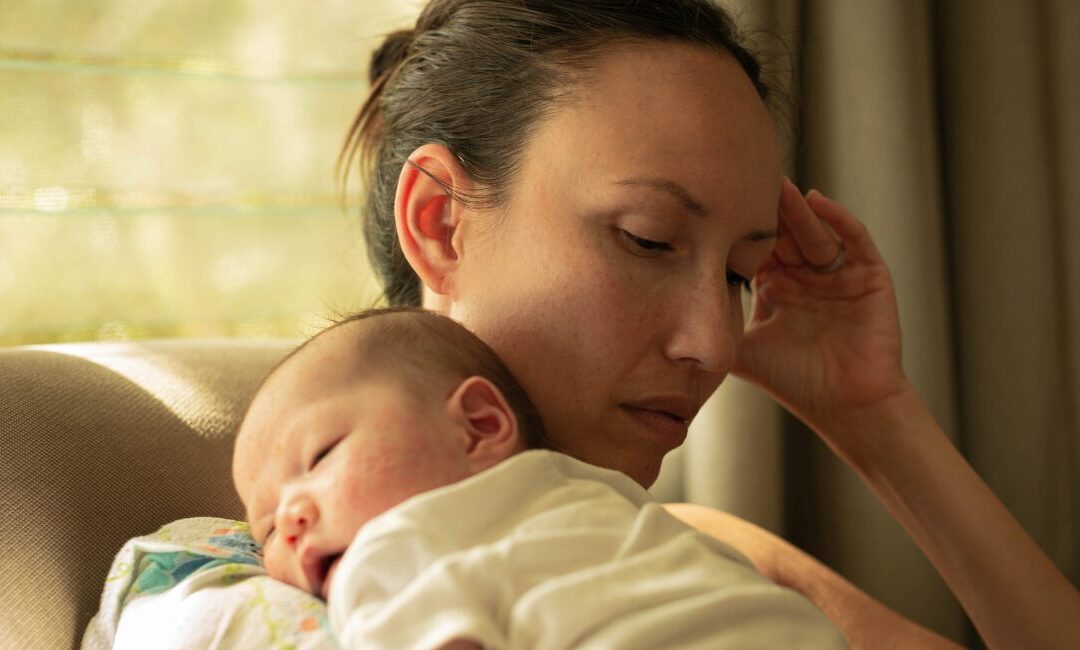The early days of parenthood are a whirlwind of emotions – joy, exhaustion, overwhelming love for your tiny miracle. But for some new mothers, this beautiful chapter can be overshadowed by unexpected emotional challenges.
Postpartum depression and anxiety (PPD/A) are real conditions that affect many women after childbirth (we’ll be using the term “PPD anxiety symptoms” throughout this blog to emphasize both aspects).
Understanding the signs of PPD anxiety symptoms is crucial for early identification and seeking proper treatment.
If you’re a new mom, partner, or concerned loved one, this blog equips you with valuable information to recognize and address PPD anxiety symptoms.
Beyond the Baby Blues: Recognizing the Red Flags
Most new mothers experience the “baby blues,” a period of short-lived emotional fluctuations. However, PPD anxiety symptoms are more intense and persistent, typically emerging within the first few weeks or months after childbirth, although they can develop up to a year later.
The key lies in recognizing the difference between occasional tearfulness, feeling overwhelmed, or brief moments of anxiety, and the prolonged, debilitating nature of PPD anxiety symptoms.
When these emotions significantly impact your ability to cope and care for your baby, it’s time to take these signs seriously.
Warning Signs: Unveiling PPD Anxiety Symptoms
Here’s a closer look at some common PPD anxiety symptoms to be aware of:
- Depression’s Grip:
- Intense sadness or hopelessness that lingers for most of the day, nearly every day. This sadness goes beyond the occasional tearfulness and feels all-encompassing.
- Loss of interest or pleasure in activities once enjoyed. Things that used to bring you joy no longer hold any appeal.
- Disrupted sleep patterns: Difficulty falling asleep, waking up frequently at night, or sleeping for excessive periods. You might feel constantly exhausted despite sleeping a lot.
- Changes in appetite or weight (without dieting). You might experience a loss of appetite or a constant urge to eat, leading to significant weight fluctuations.
- Difficulty concentrating, making decisions, or remembering things. The mental fog associated with PPD can make even simple tasks feel overwhelming.
- Feeling restless or slowed down. This can manifest as physical restlessness or a complete lack of motivation.
- Intrusive thoughts of death or suicide. These are serious symptoms that require immediate professional help.
- Anxiety’s Grip:
- Excessive worry or anxiety that is difficult to control. Even minor things can trigger overwhelming anxiety, making it hard to function normally.
- Feeling constantly on edge or restless. You might feel like you’re constantly wired or in a state of high alert.
- Panic attacks. These sudden episodes of intense fear can be accompanied by physical symptoms like heart palpitations, shortness of breath, and dizziness.
- Increased irritability or anger. The emotional toll of PPD anxiety symptoms can manifest as increased irritability and frustration.
- Feeling detached from your baby. This can be a particularly distressing symptom, as it can interfere with the natural bonding process.
- Difficulty bonding with your baby. The emotional turmoil caused by PPD anxiety symptoms can make it challenging to form a strong emotional connection with your newborn.
It’s important to remember that not every woman will experience all of these PPD anxiety symptoms. The severity and combination of symptoms can also vary. Some women might experience primarily depressive symptoms, while others might struggle more with anxiety.
Taking Action: Don’t Suffer in Silence
If you’re experiencing any of these anxiety symptoms, it’s crucial to seek professional help. Don’t be afraid to talk to your doctor or a mental health professional.
PPD/A is a treatable condition, and with the right support, you can feel better and enjoy this special time with your baby.
Struggling with PPD? GET HELP HERE.

